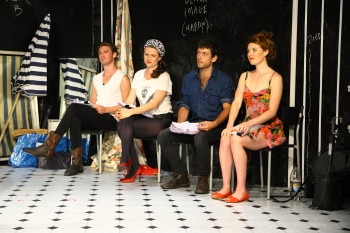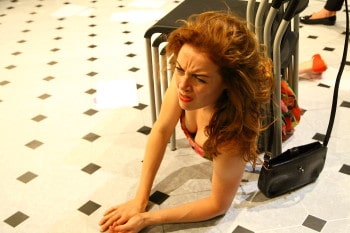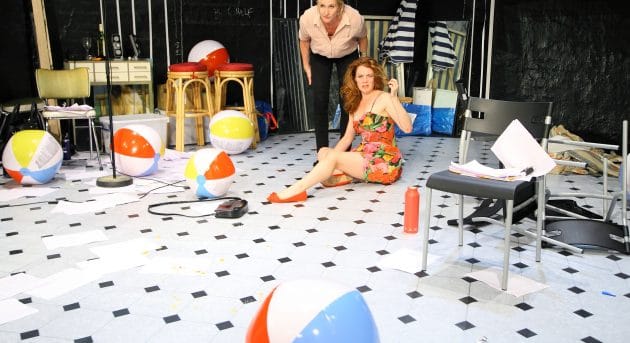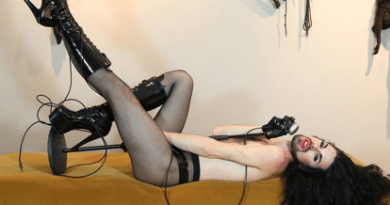Review: The Unspoken Word is Joe, Griffin Theatre Co
The SBW Stables Theatre, home to Griffin Theatre Co, has a bare stage, following, we learn, a recent revival of Hotel Sorrento. Scrawled on one wall is a placeholder set: “Beach image (happy)”. Beneath it, a row of actors sit. One woman stands at a microphone, and starts to introduce tonight’s reading of a draft script.
And that’s The Unspoken Word is Joe, a play staged as a reading that starts to unravel from the moment Natasha Herbert’s experienced actor character overshares about her own self when she’s supposed to be introducing Zoey Dawson’s play. Actors, right?

Dawson says that the play came from a comment made to her as a throwaway when she was writing – not the breakup play, that’s verboten for female playwrights. Her response to this is a savagely mortified, completely fucked-up fantasy take on the whole concept of a breakup that manages to be both hilarious and also capture the kind of flailing despair that comes from having to work out how you relate to the world all over again when you’re alone.
The reading soon dissolves into fourth-wall, all-wall breakage; Zoey’s (played by Nikki Shiels) boyfriend (Man 1, played by Aaron Orzech) suddenly starts fighting with her rather than following the script; we slip into post-rehearsal shenanigans between Zoey and Man 2 (Matt Hickey), and she’s seemingly drunk for the rest of the ride, taking it out on Woman 2 (Annie Last) as well, for no reason really except she’s in pain so why not everyone else?
Really, it’s hard to tell whether Zoey is destroying her own work or if the process of the work is destroying her; she’s patronised pretty consistently, and her pain is waved away like it’s nothing. At one point she’s described as one of Australia’s “most emerging” playwrights. There’s something here about the meat of the play being so personal and being about romantic love, and something about how she’s expected to be more capable and more together than she is. This is a common, wearying reality for women everywhere, that showing emotion is weakness and being sentimental is laughable. Dawson brings that struggle quietly to the table here through the framework of the play – as a playwright, she needs to be together and calm and professional; as a person she’s sorely not, and if she shows it will she blow her career? She certainly blows the reading.

It also touches on that other sore spot in life: that of the artist who believes what they have created is wonderful, and then, perhaps, it isn’t, or it is and it all falls apart and never goes anywhere anyway, that tumult of uncertainty that settles in the pit of a stomach. There’s so much risk involved in making theatre, particularly if you’re going to say something that matters in some way to yourself, in some way defines yourself, and Dawson manages to take that fear to its highest level and put it on display, vomit and all.
Of course, all of this is heightened in the most delightfully bonkers way, and it never feels like a serious meditation on anything, not feminism, not even the seriously strange world of Australian theatre, not writing, and a lot of that ease and absurd dark-lightness is thanks to Declan Greene, who has a particularly clever archness in his direction. Greene thrives on chaos and this play is chaos, a kind of structural anathema, and yet to pull it off requires an enormously detailed approach to structure. The play meets each beat in the script, even as it becomes more ridiculous, because Greene is a superb ringmaster of three-ring circuses.
It’s so funny. It’s so, so funny, full of plenty of nods to the theatre industry (and a shoutout to opening night audience member Adena Jacobs, when Zoey suggested she stage her play at Belvoir), and the actors are a dream, particularly Shiels as she becomes more and more unhinged.
It moves at a cracking pace, it’s genuinely funny, and it feels new, and fresh, and current, and smart. It’s a good one.



